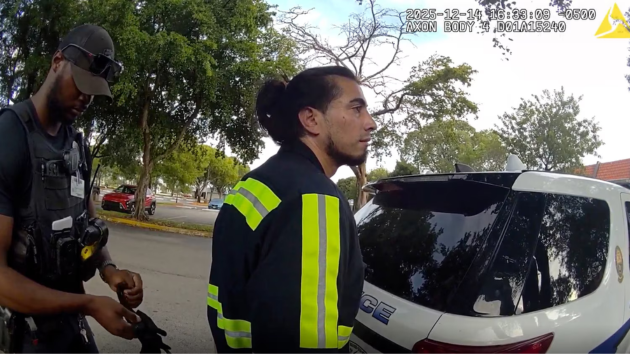Attorney leading effort to disqualify DA Fani Willis tells legislators how she uncovered allegations of misconduct
Written by ABC Audio. All rights reserved. on March 7, 2024
(ATLANTA) — Ashleigh Merchant, the lead attorney pushing for the disqualification of Fulton County District Attorney Fani Willis from the Georgia election interference case against former President Donald Trump and 18 others, provided new testimony to a Georgia Senate panel Wednesday about how she says she uncovered the romantic relationship between Willis and prosecutor Nathan Wade that sits at the heart of the misconduct allegations.
Merchant told the Republican-led committee that she was looking into possible “financial irregularities” in the election case when Wade’s former law partner and divorce attorney, Terrence Bradley, reached out to her, eventually sharing his belief that Wade and Willis had begun dating “before she became DA.”
The judge in the election interference case, Scott McAfee, is currently weighing motions to disqualify Willis, primarily over accusations from Merchant’s client, Trump co-defendant Michael Roman, that Willis benefited financially from a “personal, romantic relationship” with Wade, who she hired for the case, through Wade’s “paying for vacations across the world with money he is being paid by the Fulton County taxpayers and authorized solely by Willis.”
Willis and Wade have admitted to a relationship but said it “does not amount to a disqualifying conflict of interest” and that it “has never involved direct or indirect financial benefit to District Attorney Willis.”
Merchant, Roman’s attorney, testified Wednesday before the Georgia Senate’s Special Committee on Investigations as part of its probe into the district attorney’s office. While the panel does not have the authority to bring charges against Willis or remove her from the case, officials say their findings could lead to changes in some of the statutes governing the operations of the DA’s office.
Merchant, who testified for over three hours, said there was an immediate response when she filed her motion seeking Willis’ dismissal based on her relationship with Wade.
“I file it and at that point, the world is shocked,” she said. “I mean, shocked because nobody had any idea this had been hidden.”
Regarding Wade’s former attorney, Merchant told legislators that “Mr. Bradley essentially went through the whole thing and said, ‘Well, this is what’s really happening.’ He was very specific that it was before she became DA.”
But when Bradley was called as a witness during last week’s disqualification hearing, he reversed course, saying under oath that his remarks to Merchant were “speculation” made without personal knowledge of the matter. Willis and Wade both testified they didn’t consider their relationship to have become romantic until after Wade was hired.
Attorneys for Trump are accusing Willis of committing “appalling and unforgivable” forms of forensic misconduct through what they allege is her “testifying falsely” about the timeline of the relationship.
Willis has pushed back on any allegations of misconduct. In a filing this week, she urged the judge to reject the motion to disqualify her, saying that in order to disqualify an elected district attorney, “an actual conflict of interest must be proven” — which she says the defendants have not done.
Merchant, in her testimony Wednesday, also offered details about her conversations with Bradley and what she described as his motives. She said that Bradley was personally “upset” with Wade about the way Wade handled his divorce.
During Bradley’s testimony at the disqualification hearing, the state questioned him about a potential different motive for coming forward — saying he left the firm with Wade over a “disagreement” when he was accused by an employee of sexual assault. Bradley said he “didn’t sexually assault anybody.”
Merchant told the committee that it was Bradley who suggested Merchant track down Robin Yeartie, Willis’ former friend and one-time Fulton County DA employee who testified last month that Wade and Willis’ relationship predated Wade’s employment.
Before Merchant filed her initial motion for disqualification, she said that Bradley personally reviewed her filing and suggested changes so as not to “tip off” to others that he was her source.
“He did not want anybody to know that he was talking. He was very concerned,” Merchant said.
After filing her disqualification motion in January, Merchant claimed that Bradley received a phone call from another lawyer to probe his role in Merchant’s filing.
“He took it as what he described to me as the ‘first shot against the bow’ — you know, that they were trying to figure out if it was him, and they were trying to silence them,” Merchant said.
According to Merchant, Wade also called Bradley’s best friend — who she did not name — to request he “call Mr. Bradley and remind him of his privilege” as Wade’s former divorce attorney.
“It just seemed like tampering,” she said, adding, “He took it as intimidation, yes.”
Willis, responding to the committee hearing, told Atlanta ABC affiliate WSB-TV that it was political in nature.
“I think it’s all just a political quest,” she told WSB. “I think that people are angry because I’m going to do the right thing and I’m going to stand up for justice.”
Much of Wednesday’s testimony rehashed the allegations from the earlier evidentiary hearings, with the committee chairman Bill Cowsert peppering Merchant with questions about Willis’ office and the standards in the law.
“You’re a good investigative reporter here,” Cowsert told Merchant at one point.
However, Georgia Sen. Harold Jones, asking questions on behalf of the committee’s Democratic minority, raised concerns about the legitimacy of Merchant’s disqualification effort, including the idea that a few vacations were a financial incentive for Willis.
“So your argument is that a person who makes $200,000 a year is actually setting up prosecutions to go on a trip that costs $3,500?” Jones asked.
Cowsert said the committee is tasked with, if necessary, “amending existing statutes or creating new statutes to build guardrails … to essentially restore public faith in our criminal justice system in its impartiality and its fairness.”
Copyright © 2024, ABC Audio. All rights reserved.





